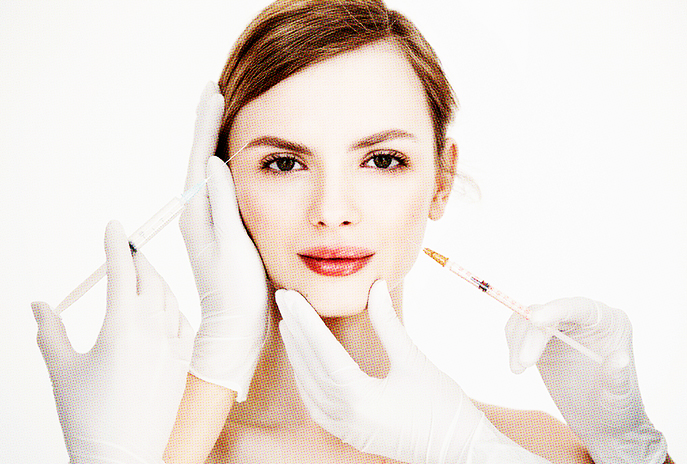Why OB-GYNs Are Offering Botox Injections

Key Points
- Patients are seeking a "one-stop shop" for medical and aesthetic care, which more OB-GYNs are offering.
- OB-GYNs may be responding to changing needs and evolving career landscapes, such as challenges related to the political climate affecting gynecological care.
- Providers offering these types of services should have the necessary competence and training in facial anatomy.
In 2020, Botox secured its spot as America's most popular minimally invasive cosmetic procedure. In 2021, more than 3.6 million cosmetic procedures involving neurotoxins such as Botox were performed, according to a study.
While we typically think of dermatologists or plastic surgeons as the select providers for cosmetic procedures, some OB-GYNs and other medical professionals now offer aesthetic services in their practices. You can get a Pap smear and a mammogram and reduce the fine lines on your face, all from the same person.
Botox has some surprising medical uses. It can alleviate migraines and treat overactive bladders and crossed eyes. However, for many OB-GYNs, the application of the service is purely for cosmetic purposes.
According to the American College of Obstetricians and Gynecologists (ACOG), the increase in Botox might have women looking for a "one-stop shop" for medical and aesthetic care. Acne treatments, "mommy makeovers" and hair removal are all fair game. Plus, as more providers offer it—dentists and OB-GYNs, to name a couple—its cultural perception could shift.
Women make up about 92 percent of the total medical aesthetic services market, according to The Obstetrics and Gynecology Clinics of North America Continuing Medical Education program. What constitutes "women's health" has no universal definition and women's health trends are constantly evolving.
"Anything that has to do with the health and well-being of women is women's health," said Stephanie Hack, M.D., a Washington, D.C.-based OB-GYN and the host of the "Lady Parts Doctor" podcast. "This includes aesthetic procedures, such as Botox."
Recommended
- Can I Get Botox While Pregnant?: The popular injectable is used to treat many conditions beyond aesthetics.
- What You Need to Know About Vaginismus: Here's what you need to know about the causes, symptoms and management of vaginismus.
- Is It Safe to Have Sex With a Concussion?: It's complicated—and it may be as much of a challenge physically as it is psychologically.
Why OB-GYNs are adding aesthetic services
"Botox cosmetic is typically injected by dermatologists, registered nurses, nurse practitioners and physician assistants," said Marie Baker, F.N.P.-C., the medical director of DermaCrush in Scottsdale, Arizona, who specializes in cosmetic dermatology and medical aesthetics.
She said there are several reasons a business might add Botox to a menu of services.
"First, it's a high-end treatment and is in demand," Baker said. "Second, it's cash pay, so there is no hassle with insurance companies. Third, injectors have done a great job showcasing how rewarding it is to enhance one's appearance without plastic surgery."
"With declining insurance reimbursements for medical procedures and the high overhead costs of dealing with insurance companies, many physicians on the whole find the aesthetic industry to be a more lucrative business," said Anita Mandal, M.D., a board-certified facial plastic surgeon at Mandal Plastic Surgery Center in Palm Beach Springs, Florida.
OB-GYNs might be attuned to the changing needs of patients alongside an ever-burgeoning cosmetic industry.
"OB-GYNs recognize an opportunity to better cater to our patient's needs," Hack said.
Also, many aspects of gynecological careers were affected by the U.S. Supreme Court's Dobbs v. Jackson Women's Health Organization decision, which essentially overturned Roe v. Wade.
"In addition, as the political climate affects our ability to provide appropriate care legally and safely, and as more physicians are coping with burnout, we are open to providing new services," she added.
Why people might see their OB-GYN for aesthetic services
If the same OB-GYN has seen you for several years, you likely have a baseline of confidence in that relationship.
"Because we are constantly discussing their most intimate concerns, people's relationships with their OB-GYNs are built on the utmost level of trust," Hack said. "Once that relationship is established, they often prefer to obtain their care from the same person."
Getting care at the same location is a matter of convenience and cost for some patients, too.
"OB-GYNs also tend to have lower prices than the plastic surgeon and that can be enticing to a novice Botox patient," Mandal said.
Finding an OB-GYN at College: Your sexual health is important, so you need a doctor who makes you feel comfortable. Here's what you should look for when choosing an OB-GYN and how to prepare for that first visit.
What qualifies a provider to offer Botox?
OB-GYNs who offer services typically provided by other specialists should possess equivalent competence, according to ACOG. But do they?
"When it comes to gynecologists specifically, these specialists spend most of their time working on the opposite end of the human body," Mandal said. "Each patient has to decide for themselves if that level of experience translates into a consistently high-quality result from Botox injections of the facial musculature."
Baker noted that to administer Botox, the provider needs to be a medical professional. Those may include the following:
- Dentists
- Licensed doctors and surgeons
- Nurse practitioners
- Physician assistants
- Registered nurses who possess the scope to inject prescription medication
"Botox treatments were first FDA-approved in 1989. They are tried and true," Baker said. "They are extremely safe as long as the product is the original FDA-approved product sold by Allergan."
Another protocol for safety is the provider performing the injections has received extensive training on facial anatomy, particularly the facial musculature, she added. Botox laws and regulations vary by state but in any case, proper training is essential.
"Any medical professional can be an expert injector if they invest in training and seek optimal patient outcomes," she said. "A provider should not offer a treatment that is not in their wheelhouse simply because they want to add another revenue stream. Anyone can hold a paintbrush but that does not make them an artist. When the canvas is someone's face, you better know what you're doing."
Myriad circumstances may impact how likely someone is to choose a specific provider for Botox injections—convenience, comfort with a particular provider and finances—but choosing a provider with sufficient expertise and equivalent training is vital to ensure safe administration.
"It takes years to become an expert injector," Baker said. "Every face is unique and should be approached as such. This is not a career where you can take a weekend course and be ready to treat patients. It happens to be a difficult area to get into, and often mentors are needed to foster professional growth."


















